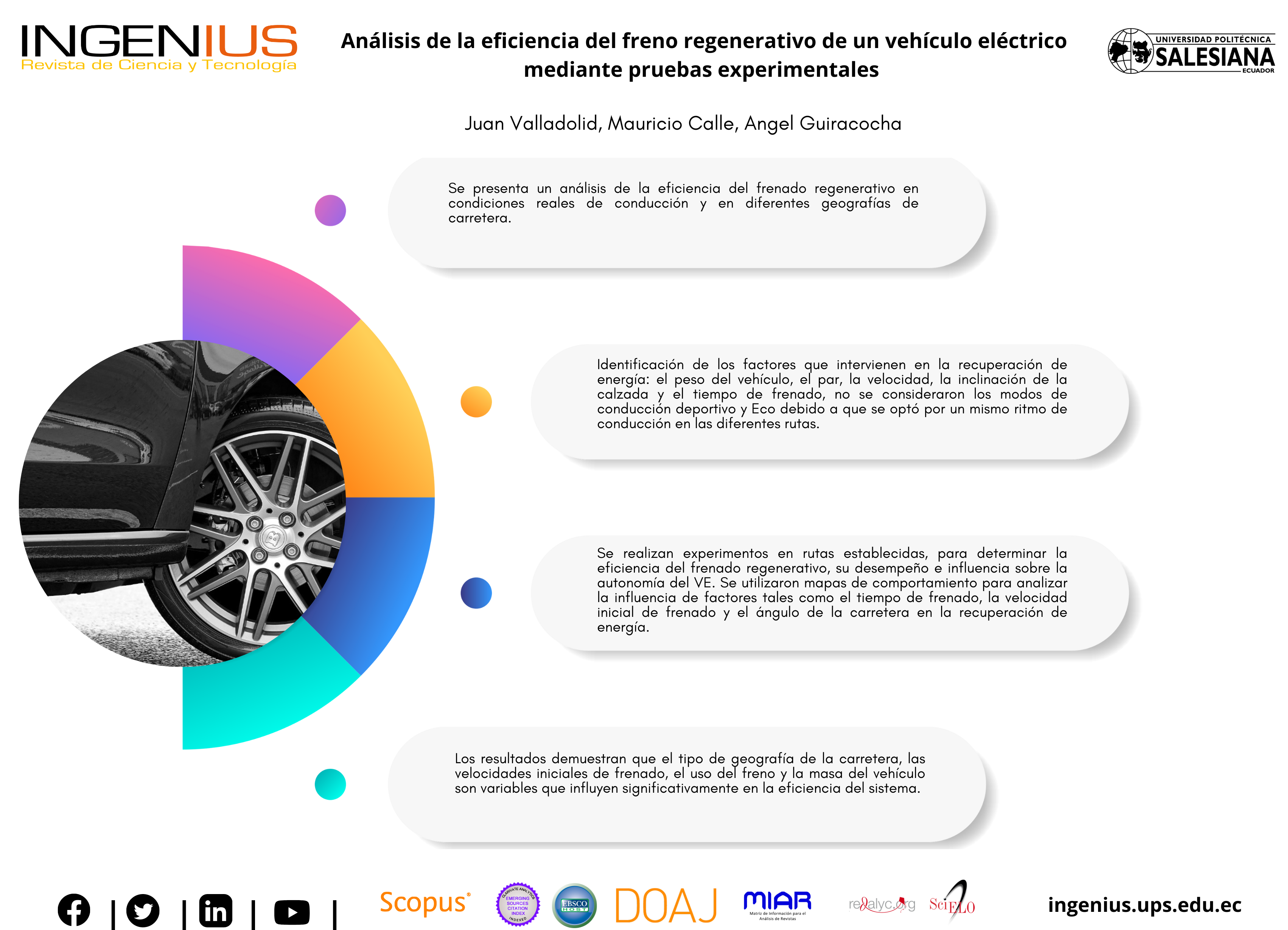Análisis de la eficiencia del freno regenerativo en un vehículo eléctrico mediante pruebas experimentales
Contenido principal del artículo
Resumen
Detalles del artículo

Esta obra está bajo una licencia internacional Creative Commons Atribución-NoComercial-CompartirIgual 4.0.
La Universidad Politécnica Salesiana de Ecuador conserva los derechos patrimoniales (copyright) de las obras publicadas y favorecerá la reutilización de las mismas. Las obras se publican en la edición electrónica de la revista bajo una licencia Creative Commons Reconocimiento / No Comercial-Sin Obra Derivada 4.0 Ecuador: se pueden copiar, usar, difundir, transmitir y exponer públicamente.
El autor/es abajo firmante transfiere parcialmente los derechos de propiedad (copyright) del presente trabajo a la Universidad Politécnica Salesiana del Ecuador, para las ediciones impresas.
Se declara además haber respetado los principios éticos de investigación y estar libre de cualquier conflicto de intereses.
El autor/es certifican que este trabajo no ha sido publicado, ni está en vías de consideración para su publicación en ninguna otra revista u obra editorial.
El autor/es se responsabilizan de su contenido y de haber contribuido a la concepción, diseño y realización del trabajo, análisis e interpretación de datos, y de haber participado en la redacción del texto y sus revisiones, así como en la aprobación de la versión que finalmente se remite en adjunto.
Referencias
P. Spichartz and C. Sourkounis, “Influence of the braking system and the type of regenerative braking request on the energy consumption of electric vehicles,” in 2020 Fifteenth International Conference on Ecological Vehicles and Renewable Energies (EVER), 2020, pp. 1–7. [Online]. Available: https://doi.org/10.1109/EVER48776.2020.9242939
J. D. Valladolid, D. Patiño, G. Gruosso, C. A. Correa-Flórez, J. Vuelvas, and F. Espinoza, “A novel energy-efficiency optimization approach based on driving patterns styles and experimental tests for electric vehicles,” Electronics, vol. 10, no. 10, 2021. [Online]. Available: https://doi.org/10.3390/electronics10101199
T. A. Skouras, P. K. Gkonis, C. N. Ilias, P. T. Trakadas, E. G. Tsampasis, and T. V. Zahariadis, “Electrical vehicles: Current state of the art, future challenges, and perspectives,” Clean Technologies, vol. 2, no. 1, pp. 1–16, 2020. [Online]. Available: https://doi.org/10.3390/cleantechnol2010001
S. Heydari, P. Fajri, N. Lotfi, and B. Falahati, “Influencing factors in low speed regenerative braking performance of electric vehicles,” in 2018 IEEE Transportation Electrification Conference and Expo (ITEC), 2018, pp. 494–499. [Online]. Available: https://doi.org/10.1109/ITEC.2018.8450260
V. Totev and V. Gueorgiev, “Efficiency of regenerative braking in electric vehicles,” in 2020 21st International Symposium on Electrical Apparatus & Technologies (SIELA), 2020, pp. 1–4. [Online]. Available: https://doi.org/10.1109/SIELA49118.2020.9167153
Y.Wang and Y. Su, “A research for brake strategy based on fuzzy control in pure electric vehicles,” in 2015 4th International Conference on Computer Science and Network Technology (ICCSNT), vol. 01, 2015, pp. 689–693. [Online]. Available: https://doi.org/10.1109/ICCSNT.2015.7490838
M. Gupta, “Evaluation of regenerative braking and its functionality in electric vehicles,” in 2020 International Conference for Emerging Technology (INCET), 2020, pp. 1–6. [Online]. Available: https://doi.org/10.1109/INCET49848.2020.9154047
J. Bian and B. Qiu, “Effect of road gradient on regenerative braking energy in a pure electric vehicle,” Proceedings of the Institution of Mechanical Engineers, Part D: Journal of Automobile Engineering, vol. 232, no. 13, pp. 1736–1746, 2018. [Online]. Available: https://doi.org/10.1177/0954407017735020
J. Zhang, X. Lu, J. Xue, and B. Li, “Regenerative braking system for series hybrid electric city bus,” World Electric Vehicle Journal, vol. 2, no. 4, pp. 363–369, 2008. [Online]. Available: https://doi.org/10.3390/wevj2040363
T. T. Duong, D. V. Do, and T. T. Nguyen, “Research on braking force distribution in regenerative braking system apply to conventional vehicle,” in 2018 4th International Conference on Green Technology and Sustainable Development (GTSD), 2018, pp. 48–52. [Online]. Available: https://doi.org/10.1109/GTSD.2018.8595456
Y. Zhang, C. Zhao, and Z. Li, “Electric vehicle regenerative braking system simulation based on Kalman filter,” in 2020 Chinese Automation Congress (CAC), 2020, pp. 2936–2941. [Online]. Available: https://doi.org/10.1109/CAC51589.2020.9327759
P. Spichartz and C. Sourkounis, “Influence of the braking system and the type of regenerative braking request on the energy consumption of electric vehicles,” in 2020 Fifteenth International Conference on Ecological Vehicles and Renewable Energies (EVER), 2020, pp. 1–7. [Online]. Available: https://doi.org/10.1109/EVER48776.2020.9242939
N. Watrin, B. Blunier, and A. Miraoui, “Review of adaptive systems for lithium batteries state-of-charge and state-of-health estimation,” in 2012 IEEE Transportation Electrification Conference and Expo (ITEC), 2012, pp. 1–6. [Online]. Available: https://doi.org/10.1109/ITEC.2012.6243437
Y. Sun, Y. Wang, R. Zhu, R. Geng, J. Zhang, D. Fan, and H. Wang, “Study on the control strategy of regenerative braking for the hybrid electric vehicle under typical braking condition,” IOP Conference Series: Materials Science and Engineering, vol. 452, p. 032092, 2018. [Online]. Available: https://doi.org/10.1088/1757-899x/452/3/032092
EmoLab. (2022) Grupo de Investigación en Ingeniería de Transporte. Universidad Politécnica Salesiana. [Online]. Available: https://bit.ly/3Sju2gP

